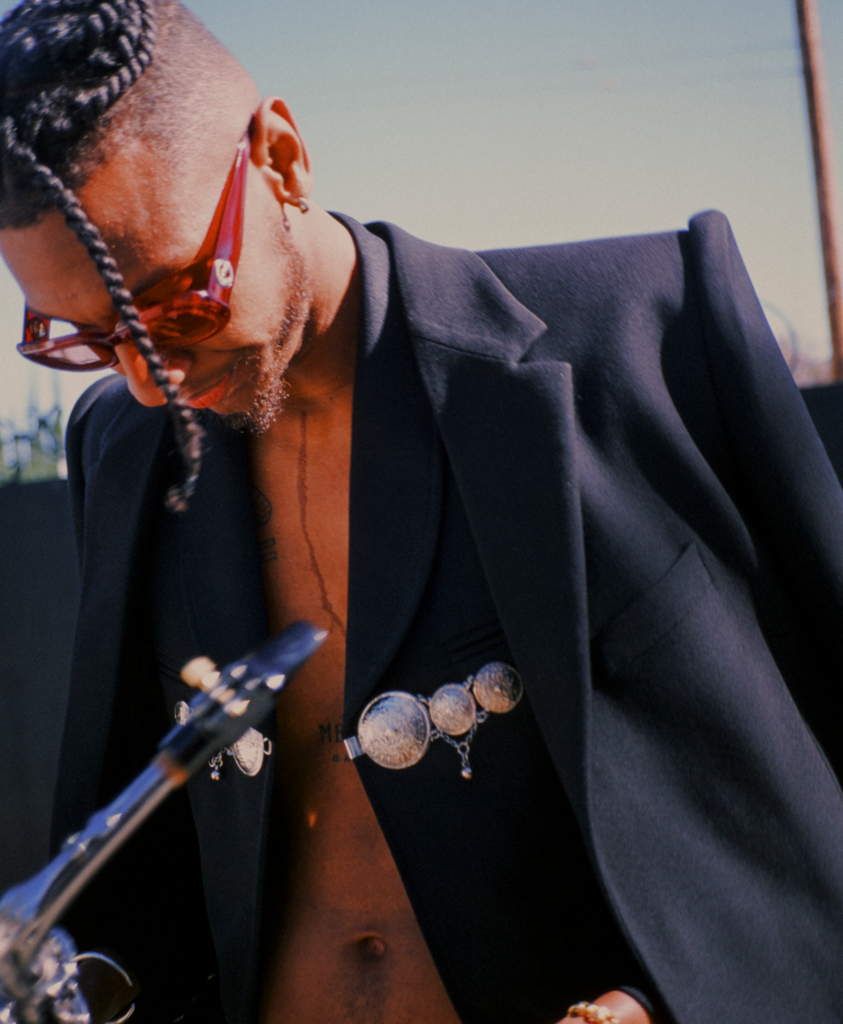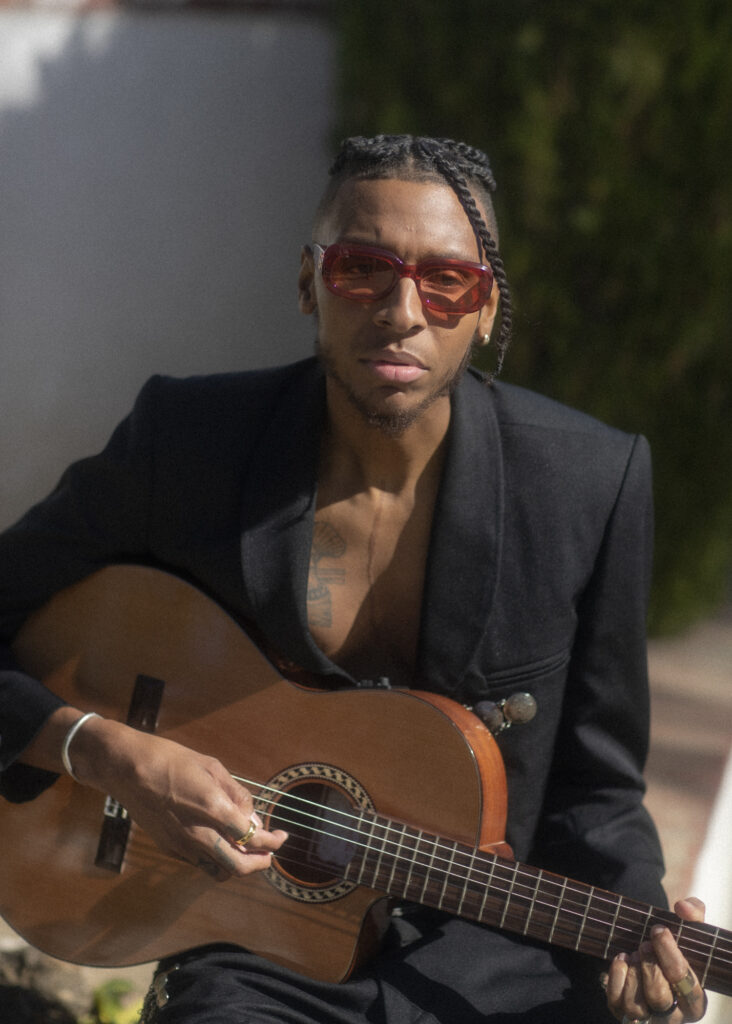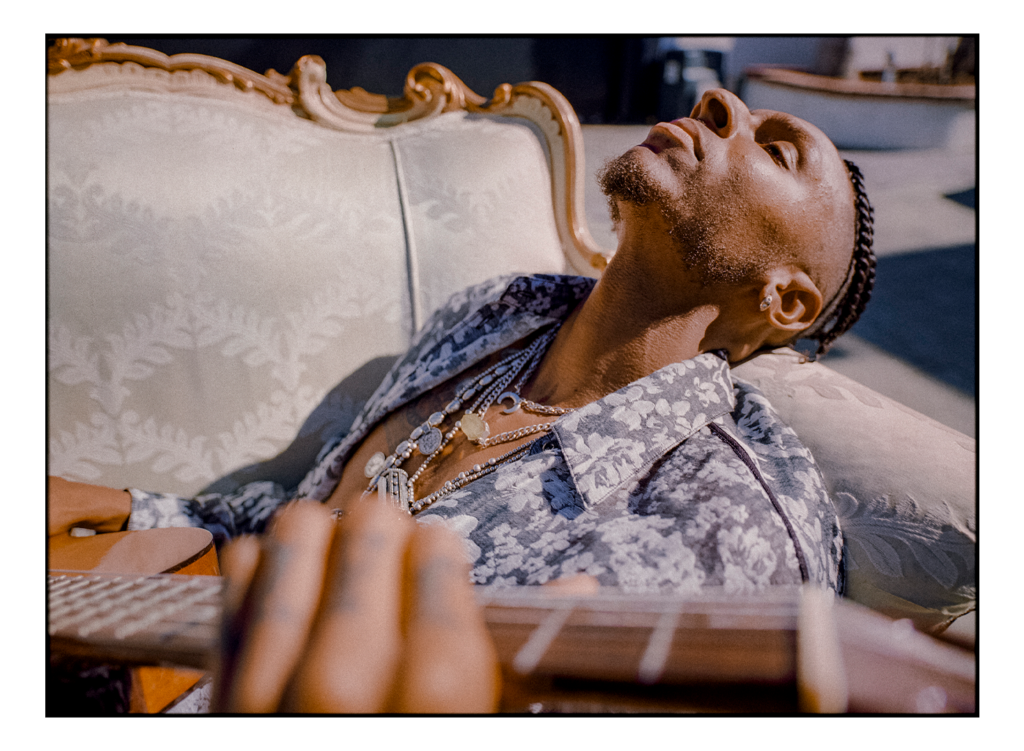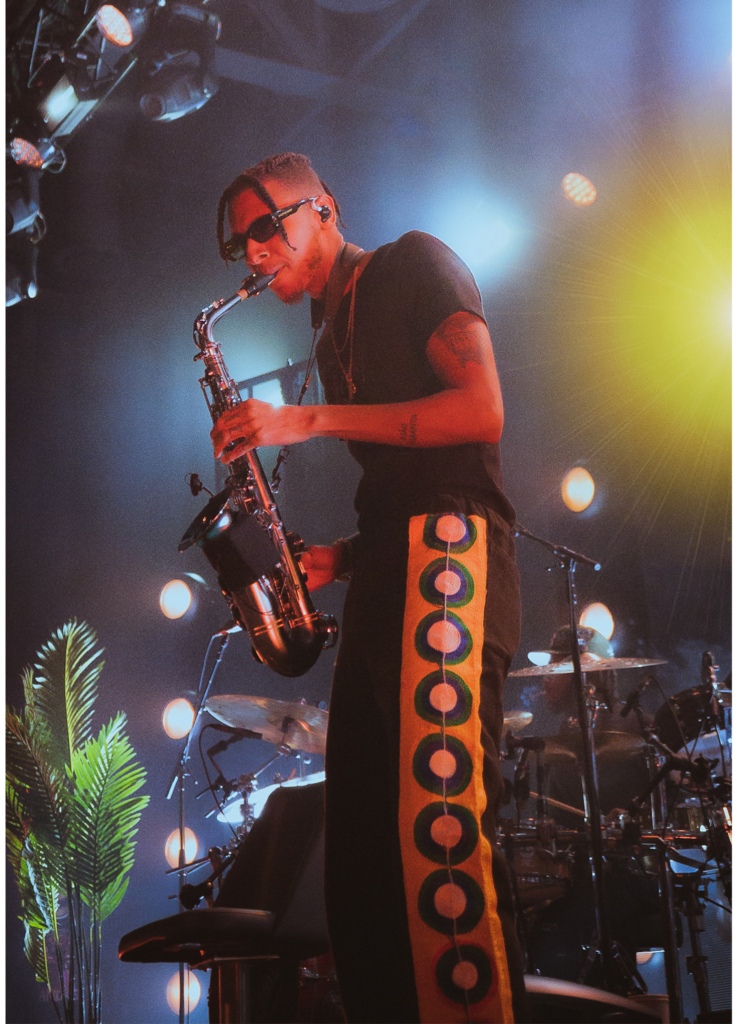COVER
Masego
The Man, the Myth, and the Young Miyazaki
By Stella He
Publishing date: Apr 14, 2023
A
As a kid, I related to the way anime protagonists behave. They just want to eat food, fight and test their strength,” Masego tells me, sinking deep into a luxurious black leather couch in the dressing room of the History venue in Toronto. In less than 2 hours, he is bound to meet a sold-out crowd on stage for the twelfth show in his “You Never Visit Me” tour and an air of excitement in the room whisks in with a hazy lull as he gears up for the motion of the night. “[Protagonists in anime] aren’t as serious about the hardships and sitting in that too long. I just loved playing music. That was my motivation.”
For Masego, his sonic and lyrical breakthroughs never came from his desire for “fame, money, or women.” Instead, the artist, multi-instrumentalist, and storyteller, now almost a decade into the game, is driven to perfect his craft by the same factors that drew him to the industry in the first place: pure admiration for the medium and the intent to stay true to himself and his passion no matter what.
Before there was Masego, there was Micah Davis. He grew up with two parents as pastors and credited the church as where his love for music began. As a young boy full of wonder in his eyes, he saw how drummers seemed so free while skittering their sticks on batter heads, which drew him to pick up the drums. He then saw how the saxophone could be used to singsong, so he picked that up too and stuck with it after seeing how receptive the ladies were to it. Much like collecting Pokémon and having the mentality of “gotta catch’em all,” his innate attraction to music and sounds led him to teach himself more instruments, including the guitar and keyboards. When he felt like he was due for a test of his abilities, he adopted the name Masego, a Tswana translation of his church name, “blessing,” and hard-launched what he coined “Trap House Jazz” music to the world.
As a kid, I related to the way anime protagonists behave. They just want to eat food, fight and test their strength,” Masego tells me, sinking deep into a luxurious black leather couch in the dressing room of the History venue in Toronto. In less than 2 hours, he is bound to meet a sold-out crowd on stage for the twelfth show in his “You Never Visit Me” tour and an air of excitement in the room whisks in with a hazy lull as he gears up for the motion of the night. “[Protagonists in anime] aren’t as serious about the hardships and sitting in that too long. I just loved playing music. That was my motivation.”
For Masego, his sonic and lyrical breakthroughs never came from his desire for “fame, money, or women.” Instead, the artist, multi-instrumentalist, and storyteller, now almost a decade into the game, is driven to perfect his craft by the same factors that drew him to the industry in the first place: pure admiration for the medium and the intent to stay true to himself and his passion no matter what.
Before there was Masego, there was Micah Davis. He grew up with two parents as pastors and credited the church as where his love for music began. As a young boy full of wonder in his eyes, he saw how drummers seemed so free while skittering their sticks on batter heads, which drew him to pick up the drums. He then saw how the saxophone could be used to singsong, so he picked that up too and stuck with it after seeing how receptive the ladies were to it. Much like collecting Pokémon and having the mentality of “gotta catch’em all,” his innate attraction to music and sounds led him to teach himself more instruments, including the guitar and keyboards. When he felt like he was due for a test of his abilities, he adopted the name Masego, a Tswana translation of his church name, “blessing,” and hard-launched what he coined “Trap House Jazz” music to the world.

You have your art, and it’s so pure and beautiful, then someone that doesn’t make art offers you an exorbitant amount of money to compromise that art, and you have a choice [to make].
You have your art, and it’s so pure and beautiful, then someone that doesn’t make art offers you an exorbitant amount of money to compromise that art, and you have a choice [to make].

His debut project, Pink Polo, was released back in 2015 on SoundCloud and acted as a humble introduction to the colorful arrangement of sounds that would eventually lead him to a Grammy nomination in 2021. In addition to earning his first platinum US record for his addicting chorus in “Tadow,” he is RIAA Gold-certified for his viral hit “Mystery Lady Ft. Don Toliver.” His unique take on universal themes of love, loss, desires, and the exploration of the dichotomy of himself—a smooth-talking romantic with burgeoning talent wrestling with his ego, granted him the title of a novelist. His talent was further broadcasted when Drake tapped him to help produce the blockbuster album Certified Lover Boy in 2021.
Looking back, Masego’s rise to popularity seems predestined, hinted by his unwavering faith in his craft and perseverance to make it happen. In our short time together, he tells me about his past as a street musician in front of Saks Fifth Avenue, where he would make a game out of how many strangers he could earn respect from. Even while homeless, he knew that wasn’t an end but a part of his story. And he was right. That chapter in Masego’s life solidified his dedication to his sound and became the final piece in the toolkit he needed to navigate his newfound fame.
“You have your art, and it’s so pure and beautiful,” he says, “then someone that doesn’t make art offers you an exorbitant amount of money to compromise that art, and you have a choice [to make].” Masego recognizes that it’s not easy for most people, “you spent the beginning trying to get money; that’s what everybody preaches about. Once you get it, you learn how much you don’t need it. It’s a weird thing to try to explain to people because everyone is trying to make money.”
Masego cites the environment he grew up in and his Jamaican heritage as part of his complicated relationship with money. “We’re super about getting money,” he said. “The whole we-have-a-bunch-of-jobs stereotype. I think it’s kind of true because it’s like, gotta get money, gotta get out of this third-world country. So I feel like trying to unlearn that and have a healthier relationship with money is a journey in itself.” And on this journey, Masego’s compass steers him to Dave Chappelle.

“I don’t think I have balance yet, to be honest. I think I’m seeking routine and seeking the balance between, even my kindness. I’m still too nice, in my opinion. I think me being aware that I’m still trying to find the balance is on the road to achieving it.
“Shoutout Dave Chappelle,” he exclaims in fondness before elaborating on referencing him in his song “Who Cares Anyway.” The comedian infamously left his show in 2005 at the peak of his career and walked away from $50 million, for that matter, to reflect on his craft and focus on his family. “I think I relate to [him] because my peace of mind, my art, and my integrity are more than this large [amount of] money that you’re gonna offer me.” Recognizing his value in himself, Masego chooses to protect his art over the luxury and affluence money claims to bring.
Mixing smooth jazz with a genre-bending blend of hip-hop, soul, afrobeat, and bossa nova, Masego is a master musician and lyrical wizard that even the most skillful linguists in the world would find it hard to define his sonic capabilities. In his latest self-titled album, Masego, he grapples with his dualities, contemplations in love, aspirations, and his place in the industry with knowing humor.
“Black Anime” is one of those songs that draws you in like quicksand with its compelling production and makes you stay for its profound discussion on ambition. In the song, the Virginian-born Jamaican is the self-proclaimed young Hayao Miyazaki, the mastermind and creative genius behind Studio Ghibli films like My Neighbour Totoro and Kiki’s Delivery Service. However, speaking of his new title, he turns modest.

“I kind of don’t believe I’m the young Miyazaki, but you gotta say it until you believe it,” he says. “Like Lil Wayne says [that he’s] the best rapper alive until people believe it, that is kind of my proclamation. In anime, you always declare something like, I’m the king of the world. You just gotta say something wild until you catch up with it.”
In contrast, “Eternal Sunshine (Fire Pit),” is a stark shift in the album’s thematic proposition as he comes to a begrudging acceptance of fame but still longs for a simpler time when he gathers around a fire pit with friends. Songs like these are, I suspect, the reason so many fall for Masego’s music—that duality in having the guts to declare what he wants and the sensitivity to reflect on his place in the world. “The two [songs] speak together,” Masego says. “There is a little bit of a dream that you have to hold onto to function and have purity in your art. But you have to be in reality to realize that, okay, there are logistics to this.” That balance of having a child-like approach to life and the business-savviness of an adult to navigate the world is something Masego aims to strike, and like us, he admits he doesn’t have it all figured out.

“I don’t think I have balance yet, to be honest. I think I’m seeking routine and seeking the balance between, even my kindness. I’m still too nice, in my opinion. I think me being aware that I’m still trying to find the balance is on the road to achieving it.”
Masego’s pen is another piece that makes him as an artist so compelling. He isn’t afraid to be vulnerable and does it in a way full of sensibility and intellect. He attributes this to growing up surrounded by women, where he learned how necessary emotional intelligence is in having a meaningful relationship of any sort. He recognizes that after his Lady Lady era, he was drained. He needed to fill his cup with good energy and wellness and did so through meditation and self-care practices. To cope with the nuances of fame, touring, and general global star activities, he turns to himself to regulate his thoughts and finds solace in the mayhem that ensues in his life.
As our interview comes to an end, Masego’s attention shifts to his performance for his Toronto fans. The time strikes 9:05 PM, and all goes black. As the stage lights up in red to show the band’s silhouettes, a buttery saxophone riff floods the venue marking the artist’s official presence. Screams get louder to urge Masego to show face. Finally, the man of the hour walks up with a saxophone in his hands and serenades the crowd with the chorus to “Navajo,” kickstarting the show.

As he croons through the intro, a medley of “Queen Tings,” “Old Age,” and “Lady Lady,” follows. He sings, “Happy to call you my lady, you’re special/Happy that you’re my baby,” and throws fresh roses to the crowd. When the intro to “Black Anime” comes on, he brings out a money gun to shower the crowd with Masego bills. What follows is an audience member invited on stage, a costume change to an apron for “Mystery Lady,” a yam, yes the vegetable, brought out for “Yamz,” and a balloon crown put on his head for “Sides of Me.” Following in the footsteps of the anime master, Masego brings the crowd out of this world to get lost in the dreamland he constructed with his instruments and visual spectacles. Strung together by dreamy loops and glittery tunes, the hour-and-a-half program is more than enough to prove that the musician is further along to being the true young Miyazaki than he makes himself believe.
Into the second half of the show, “Two Sides” comes on, and he gestures for the crowd to raise their hands, saying, “Two hands in the sky if you like me for two sides,” like a conductor in front of an orchestra. And at this point, it becomes clear to me the true fascination of Masego and where the ultimate source of his powers lies: within himself. By being authentic, expressing his passion boldly, and embracing all the quirks and layers of who he is, he commands crowds beyond cities and dimensions and is simply unignorable.
Photographer: Sam Erickson & Laura Kim
